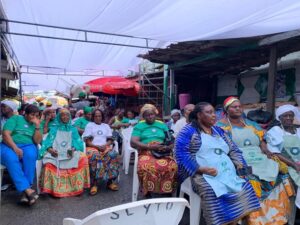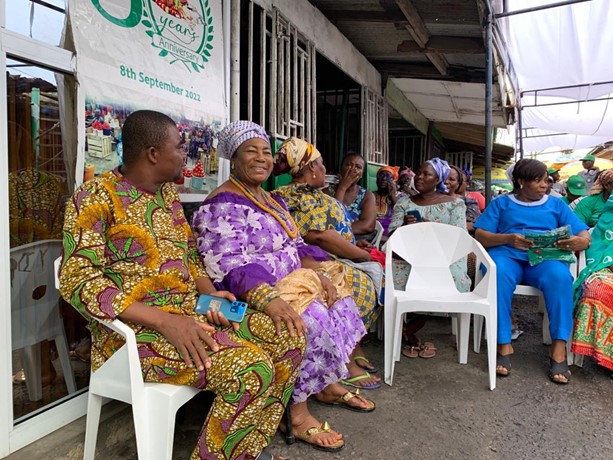The Greater Accra Market Traders Association (GAMTA), led by its president and Queen Mother, Mercy Afrowa NeeDjan, has partnered with Waltergates Ghana, an IT solutions firm, to establish a Database Management System (DBMS) and a cooperative for its members.
The cooperative’s goal is to promote financial inclusion through issuing smart ID cards with payment capabilities to traders – many of whom previously operated outside formal banking systems.
This move will not only enhance their economic status but also contribute to the country’s overall economic growth.
The activation of GAMTA cooperative was held at the newly established information centre at Agbogbloshie Market in Accra. It was on the theme ‘Agbogbloshie Cooperative Activation’.
At the programme, the Queen Mother spoke at length about challenges faced by the traders; including the lack of pensions and insurance to cover damages they may incur, and how a lot of the traders are also being cheated out of their money through dubious schemes.
“Workers in the formal sector have a lot of things done for them. They have pensions and insurance so that later in life they can benefit from them, but we [market women] don’t have things like that; so when problems arise, or a flood or fire breaks out and our things are destroyed, we must go and sit at home,” she said.

She however said there is strength in oneness, and that the partnership with Waltergates Ghana Ltd. has the potential to create many opportunities for members.
On his part, Chief Executive Officer-Waltergates Ghana, Solomon Andoh said: “The Queen Mother came to us with her vision of empowering her people and bringing them out of poverty. We came up with a solution and decided that setting up a cooperative is the best way to ensure the people are empowered, knowing that they’re part-owners of the cooperative”.
He spoke more about the initiative providing them with training and grants, thus helping create a proper welfare system to help them grow their businesses. “We aren’t just doing this for the GAMTA, we are doing this for other Council for Indigenous Business Associations (CIBA) members as well.”
The partnership, he explained, is not limited to only the Agbogbloshie Market but will be implemented in all other markets across the Greater Accra Region.
He said the ultimate goal is to empower more people in the informal sector, providing them with the means to secure their future.
“Looking at the informal sector, we’re aiming for 5 million people across the nation. If we’re able to make sure that all of them are doing their pensions, it is a plus to the nation. We’re creating employment as well, through giving opportunities to mobile bankers and other personnel who will deal with the money and other aspects.”
The heart of this transformative initiative lies in the issuance of smart ID cards to all registered members, each equipped with innovative payment solution capabilities. Through daily contributions of GH¢5 to their cooperative accounts, these market traders will gain access to an array of mandatory welfare benefits.
Among the notable welfare benefits is a focus on addressing the pressing issue of pensions in the informal sector.
According to the National Pensions Regulatory Authority (NPRA) 2021 Annual Report, pension coverage for the informal sector currently stands at a mere 4 percent, despite over 80 percent of Ghana’s workforce being employed in this sector. With this infrastructure’s establishment, the association aims to rectify this disparity by providing traders with a reliable means to secure their future.
In addition to pensions, the GAMTA cooperative will offer traders opportunities for investments, consumer credit, soft loans and a comprehensive life insurance cover that includes protection against death, disability and hospitalisation.
Moreover, the project extends to include general insurance coverage against fire, burglary and floods, ensuring the traders’ livelihoods are safeguarded against potential threats.
This project has potential to uplift the lives of thousands of market traders, boost productivity, and create a positive impact and ripple-effect on the economy.










